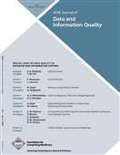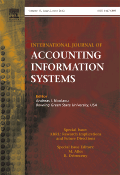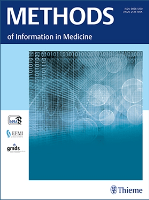
ACM Journal of Data and Information Quality
Scope & Guideline
Empowering Researchers with Quality Data Insights
Introduction
Aims and Scopes
- Data Quality Assessment and Improvement:
Research on methodologies and frameworks for assessing and enhancing data quality, including techniques for data cleaning, validation, and completeness. - Human-in-the-Loop Approaches:
Exploration of interactive systems where human expertise is integrated into data curation processes, improving the quality of data through user involvement. - Machine Learning and AI for Data Quality:
Investigating the use of machine learning algorithms and artificial intelligence to automate and improve data quality tasks, such as anomaly detection and data cleansing. - Ethics and Governance in Data Management:
Studies focusing on the ethical considerations and governance frameworks necessary for responsible data usage, including fairness, transparency, and accountability. - Multimodal Data Integration:
Research on combining different types of data (text, images, time series) to enhance data quality and facilitate comprehensive analysis in various applications.
Trending and Emerging
- AI-Driven Data Quality Solutions:
A notable increase in research papers exploring the integration of artificial intelligence and machine learning in data quality tasks, signaling a trend towards automation and intelligent systems. - Focus on Ethical Data Practices:
Emerging themes around ethics and governance in data usage reflect a heightened awareness of the implications of data management, particularly concerning fairness and accountability. - Human-Centric Data Curation:
Research emphasizing human involvement in data processes is gaining traction, showcasing the importance of collaborative approaches in enhancing data quality. - Contextual and Multimodal Data Quality:
There is a growing interest in assessing data quality across various contexts and modalities, highlighting the need for comprehensive frameworks that address the complexities of modern data ecosystems. - Application of Data Quality in Emerging Technologies:
Increased publications relating to data quality in fields like IoT, blockchain, and social media analytics suggest a trend toward exploring data quality challenges in new technological landscapes.
Declining or Waning
- Traditional Data Cleaning Techniques:
There seems to be a decline in papers focusing solely on traditional data cleaning techniques without integrating newer technologies or methodologies, indicating a shift towards more innovative solutions. - Static Data Quality Frameworks:
Research centered on static models for data quality assessment is becoming less frequent, as there is a growing preference for dynamic and adaptive frameworks that can respond to real-time data changes. - Basic Data Management Practices:
Papers discussing foundational data management practices are waning, likely due to a focus on more complex and integrated approaches that incorporate advanced technologies like AI and machine learning.
Similar Journals

Frontiers in Big Data
Championing Open Access for Groundbreaking ResearchFrontiers in Big Data, published by Frontiers Media SA in Switzerland, is a leading open access journal that has established itself as a vital resource for scholars and practitioners in the expanding realms of artificial intelligence, computer science, and information systems since its inception in 2018. With an impressive impact factor reflected in its Q2 rankings across multiple categories, including Artificial Intelligence, Computer Science (Miscellaneous), and Information Systems, this journal serves as a pivotal platform for disseminating groundbreaking research and promoting interdisciplinary collaboration. The journal's commitment to open access ensures that high-quality research is readily accessible to a global audience, fostering the exchange of innovative ideas and advancements in big data technologies. By creating an inclusive space for diverse perspectives, Frontiers in Big Data aims to bridge the gap between theoretical research and practical application, making it an essential read for anyone invested in the future of data science.

Big Data Mining and Analytics
Pioneering Research in Data-Driven SolutionsBig Data Mining and Analytics, published by TSINGHUA UNIVERSITY PRESS, stands at the forefront of interdisciplinary research in the fields of Artificial Intelligence, Computer Networks and Communications, Computer Science Applications, and Information Systems. With an impressive Q1 ranking in multiple categories as of 2023, this journal serves as a critical platform for researchers and professionals eager to explore innovative techniques and methodologies related to big data analytics. Since its transition to Open Access in 2018, Big Data Mining and Analytics has aimed to increase the visibility and accessibility of its cutting-edge research, making permanent strides in the global academic landscape. Housed in Beijing, China, and actively embracing the converged years from 2018 to 2024, the journal aims to cultivate a rich discourse on emerging trends and applications, ensuring its relevance in a rapidly evolving technological environment. Join a vibrant community of scholars dedicated to advancing the frontiers of knowledge in big data.

JMIR Medical Informatics
Empowering Health Innovations with Data-Driven InsightsJMIR Medical Informatics is a leading open access journal dedicated to the field of medical informatics, published by JMIR Publications, Inc. since 2013 in Canada. With an impressive impact factor and a distinguished Q2 ranking in both Health Informatics and Health Information Management categories, this journal plays a pivotal role in disseminating cutting-edge research and innovative practices. Covering a wide scope that includes clinical informatics, health information systems, and data analytics, JMIR Medical Informatics provides valuable insights for researchers, practitioners, and policymakers alike. The journal is accessible to a global audience, ensuring that pioneering studies and methodologies reach those who can apply them to enhance health outcomes. With its commitment to advancing the body of knowledge in medical informatics, this journal stands as a vital resource for anyone involved in or studying the intersection of healthcare and technology.

Jordanian Journal of Computers and Information Technology
Catalyzing Academic Excellence in Computing ResearchJordanian Journal of Computers and Information Technology, published by Princess Sumaya University and SRSF, stands as a significant platform for scholarly research in the realm of computer science, particularly in topics related to emerging technologies and information systems. With its Open Access model initiated in 2015, the journal facilitates global access to high-quality research findings, embodying the principles of knowledge sharing and academic collaboration. The journal's ranking in the Q3 category of Computer Science (miscellaneous) and its placement in the 54th percentile of Scopus' General Computer Science rankings underscore its growing reputation among researchers and professionals alike. Situated in Amman, Jordan, the journal actively contributes to the regional and international discourse on computing methodologies, applications, and innovations, making it an indispensable resource for scholars seeking to advance their understanding and engage with contemporary issues in technology.

International Journal of Accounting Information Systems
Advancing Knowledge at the Intersection of Accounting and TechnologyInternational Journal of Accounting Information Systems, published by Elsevier, is a premier academic platform dedicated to advancing scholarship in the intersecting fields of accounting, finance, and information systems. With a robust impact factor reflective of its standing, this journal has maintained a Q1 ranking across multiple categories as of 2023, including Accounting, Finance, and Management Information Systems. By disseminating high-quality research, the journal serves as an essential resource for academics, practitioners, and students who seek to deepen their understanding of innovative accounting practices and information system technologies. Established in 2000, the journal consistently showcases cutting-edge research and case studies that resonate with contemporary challenges in the business environment. Subscribers can benefit from a wealth of knowledge that informs both theory and practice, furthering the development of effective accounting information systems and strategic management decisions.

Information Technology and Control
Unlocking potential through interdisciplinary insights.Information Technology and Control, published by Kaunas University of Technology, is a prominent open access journal dedicated to the fields of computer science, control and systems engineering, and electrical and electronic engineering. With an ISSN of 1392-124X and a notable reputation, the journal has continuously contributed to the dissemination of innovative research since its establishment in 2008. As of 2023, it ranks in the Q3 quartile for Computer Science Applications and in the Q2 quartile for both Control and Systems Engineering and Electrical and Electronic Engineering, reflecting its growing influence in these disciplines. The journal provides a platform for the latest developments in technologies driving the industry forward and encourages an interdisciplinary approach to problem-solving. With open-access solutions implemented in 2020, it ensures that research findings are readily accessible to a global audience, supporting knowledge transfer and collaboration among researchers, professionals, and students alike. This inaugural introduction underscores the journal's commitment to fostering innovation and excellence in the rapidly evolving landscape of information technology and control.

Information
Cultivating a community of information pioneers.Information is a distinguished open-access journal published by MDPI since 2010, dedicated to advancing the field of Information Systems. With its E-ISSN 2078-2489, the journal serves as a crucial platform for researchers, professionals, and students to disseminate and access innovative research and methodologies in the domain of information science, data management, and technology. Based in Basel, Switzerland, the journal has established a commendable reputation in the academic community, currently holding a Q2 ranking in the prestigious Scopus category of Information Systems, and occupies the 74th percentile among its peers. The breadth of the journal's objectives is to promote and facilitate the open exchange of ideas, research findings, and emerging trends, fostering collaboration and knowledge growth in a rapidly evolving digital landscape. With an unwavering commitment to high-quality scholarship and accessible knowledge, Information plays an essential role in shaping the future of the information sciences.

Acta Informatica Pragensia
Fostering Dialogue: Elevating Research in Library and Information Sciences.Acta Informatica Pragensia is a prominent open access journal published by UNIV ECONOMICS, PRAGUE, which has been dedicated to advancing the fields of Computer Science Applications, Information Systems, Library and Information Sciences, and Management Information Systems since its inception in 2012. Situated in the beautiful Czech Republic, this journal aims to foster academic dialogue and disseminate high-quality research across these interdisciplinary domains. With an H-index indicating its growing impact, Acta Informatica Pragensia offers authors the opportunity to publish their findings in a Q4 ranked journal within significant categories according to the 2023 metrics, including a notable Q3 in Library and Information Sciences. Its placement in the Scopus ranks also showcases its relevance in the field, including a solid position in the 58th percentile for Library and Information Sciences. The journal's open access model ensures that research is widely available, empowering students, researchers, and professionals to engage with the latest innovations and trends. Submissions from diverse backgrounds are welcomed, making it an essential resource for those seeking to contribute to the evolution of information technology and systems.

METHODS OF INFORMATION IN MEDICINE
Elevating Patient Care with Advanced Information Methodologies.METHODS OF INFORMATION IN MEDICINE, published by Georg Thieme Verlag KG, stands at the forefront of medical knowledge dissemination, pushing the boundaries of Advanced and Specialized Nursing, Health Informatics, and Health Information Management. Established in 1962, this prestigious journal has continuously evolved to address the dynamic landscape of healthcare and information technology, aiming to bridge the gap between clinical practice and innovative information technologies. With a robust impact factor reflected in its 2023 Scopus rankings, where it holds a commendable position in Q1 for Advanced Nursing, it serves as an invaluable resource for researchers, practitioners, and students alike. While it maintains a subscription-based access model, the journal fosters the exchange of pioneering methodologies and transformative ideas that are crucial for advancing healthcare delivery and improving patient outcomes. Explore the latest research, expert insights, and cutting-edge developments that solidify the journal’s role as a leader in the interdisciplinary approach to medicine and information systems.

Journal of Big Data
Unlocking the Potential of Big Data TechnologiesJournal of Big Data, published by SPRINGERNATURE, is a leading academic journal dedicated to advancing the understanding and application of big data technologies and methodologies across various domains. Since its inception in 2014, this Open Access journal has gained recognition for its rigorous peer-reviewed research, boasting impressive rankings in multiple categories in Scopus, including Q1 in Computer Networks and Communications and Q1 in Information Systems. With its impactful contributions, the journal is positioned at the forefront of scholarly work on big data, addressing critical topics such as data analytics, storage, visualization, and applied data science. Its global reach and commitment to disseminating knowledge ensure that researchers, professionals, and students have equitable access to groundbreaking findings that empower advancements in technology and information systems. The Journal of Big Data continues to foster collaboration and inspire new research avenues leading to tangible impacts in the field.